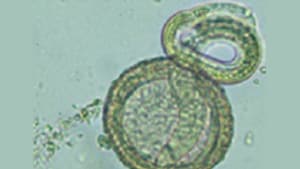Key points
- Racoon roundworm is an intestinal parasitic infection caused by Baylisascaris worms.
- You can get racoon roundworm when you consume infectious eggs, usually accidentally.
- Infections in people are rare, but the parasite can infect other animals, like dogs.

Overview
Baylisascaris infection is caused by a roundworm found in raccoons. This roundworm can infect people as well as a variety of other animals, including dogs. Human infections are rare but can be severe if the parasites invade the eye (ocular larva migrans), organs (visceral larva migrans) or the brain (neural larva migrans).
Species
Different species of Baylisascaris are associated with different animal hosts. For example, Baylisascaris procyonis is found in raccoons, and Baylisascaris columnaris is found in skunks. Cases of Baylisascaris infection in people are not frequently reported but can be severe. Baylisascaris procyonis is thought to pose the greatest risk to people because of the often-close association of raccoons to human dwellings.
Symptoms
The incubation period (time from exposure to symptoms) is usually 1 – 4 weeks. If present, signs and symptoms can include
- Nausea
- Tiredness
- Liver enlargement
- Loss of coordination
- Lack of attention to people and surroundings
- Loss of muscle control
- Blindness
- Coma
Causes and spread
People become infected by consuming infectious eggs. Most infections are in children and others who are more likely to put dirt or animal waste in their mouth by mistake.
Prevention
Eggs passed in raccoon feces are not immediately infectious. In the environment, eggs take 2 – 4 weeks to become infectious. If raccoons have set up a den or a latrine (places where raccoons defecate) in your yard, raccoon feces and material contaminated with raccoon feces should be removed carefully and burned, buried, or sent to a landfill. Care should be taken to avoid contaminating hands and clothes. Treat decks, patios, and other surfaces with boiling water or a propane flame-gun (exercise proper precautions). Prompt removal and destruction of raccoon feces before the eggs become infectious will reduce risk for exposure and possible infection.
Do not keep, feed, or adopt wild animals, including raccoons, as pets.
Washing your hands after working or playing outdoors is good practice for preventing a number of diseases.
Diagnosis
You should discuss your concerns with your healthcare provider, who will examine you and ask you questions (for example, about your interactions with raccoons or other wild animals). Baylisascaris infection is difficult to diagnosis in humans. There are no widely available tests, so the diagnosis is often made by ruling out other diseases.
Treatment
A healthcare provider can discuss treatment options with you. No drug has been found to be completely effective against racoon roundworm in people. Albendazole, a broad spectrum anthelmintic, has been recommended for specific cases.
Early treatment might reduce serious damage caused by the infection. If you suspect you may have ingested raccoon feces, seek immediate medical attention.
